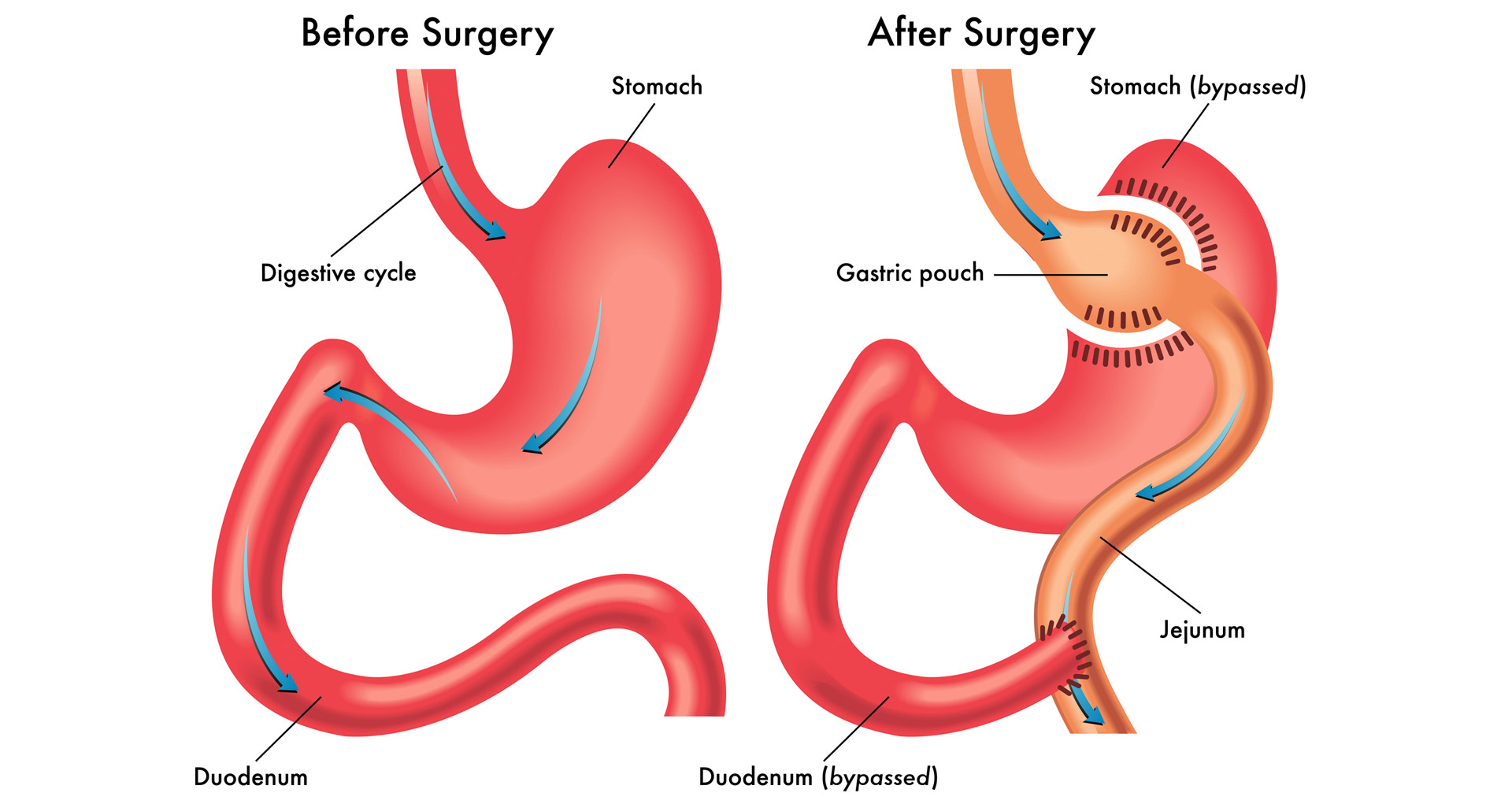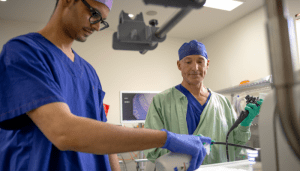At Winnett Specialist Group, we are dedicated to helping you achieve long-term weight loss and better health through personalised, evidence-based care. Led by Dr Jason Winnett, a specialist bariatric surgeon with over 20 years of experience, our Melbourne-based team offers a range of weight loss procedures, including Mini Gastric Bypass surgery. This procedure is only recommended to patients after a comprehensive medical assessment to ensure it is safe and suitable for each patient.
 Considering Mini Gastric Bypass?
Considering Mini Gastric Bypass?
If you’re considering your options or just want to understand what might be right for you, we’re here to help. We’ll start with a thorough medical assessment and talk you through whether Mini Gastric Bypass is the right fit. Get in touch with us here to speak with our team in Melbourne.
What is the Mini Gastric Bypass ?
The Mini Gastric Bypass is a newer version of the traditional Gastric Bypass. It is both restrictive and malabsorptive. The main difference is that it is a less complicated procedure because it bypasses 2m of the small bowel. Theoretically, this procedure also has less likelihood of a staple “leak” than the standard Gastric Bypass because it requires only one anastomoses (surgical join), compared with standard Gastric Bypass, which requires two.
Some studies show that the Mini Gastric Bypass has similar or even better long-term weight loss results than the Gastric Sleeve and Roux-en-Y and Gastric Bypass. The surgery is done via laparoscope and typically involves a 2-3 days in hospital. Whilst the Mini Gastric Bypass is still more invasive than Sleeve Surgery, it is less invasive than the standard Gastric Bypass (about 50 minutes faster – or roughly 1.5 hours to 2.5 hours on the table).

Who is suitable for a Mini Gastric Bypass surgery?
Suitable candidates for Mini Gastric Bypass include:
- People with a BMI >40
- People with BMI > 35 plus at least one obesity co-morbidity
- There is no upper age limit, however the procedure has been found to be riskier over age 65, (although an obese but otherwise healthy 70-year-old, maybe be less risky than a 60-year-old who has multiple co-existing obesity conditions.)
- Most surgeons prefer the Gastric Bypass over the Mini Gastric Bypass because it has been around longer, more staff are trained in the procedure, and there are more studies on long-term outcomes.
- However, there are two groups where the Mini Gastric Bypass may offer advantages.
- These include people with very severe diabetes, or the extremely obese (more than 180kg) as weight loss has been shown to be slightly higher in the Mini Gastric Bypass. Your surgeon will weigh up the options that best suit your circumstances.
- Severe reflux patients may also be considered for this procedure. One recent study shows that despite initial concerns The Mini Gastric Bypass may increase significant reflux issues, this was not the case after a year – and both standard and the Mini procedure had the same effect on reflux after the 12 month mark, although the Mini Gastric Bypass did exaggerate reflux initially.
Who is not suitable for a Mini Gastric Bypass Surgery?
- People who are not committed to significant lifestyle change which includes healthy eating and exercise
- People who are heavy drinkers or smokers
- People who gain weight during the surgical evaluation process
- People who have had multiple abdominal surgeries
- Some mental health conditions. These include binge eating disorder, substance abuse, anxiety disorders, major depression, schizophrenia and severe bipolar, or people who have ongoing issues due to sexual abuse. People with these conditions may still be able to have surgery, but these conditions need to be assessed by your surgical team.
- People who take multiple medications for these conditions may also need to consider that the Mini Gastric Sleeve is a “malabsorptive” procedure and can reduce the effectiveness of these medications in the intestine.
What is the treatment protocol?
- Before surgery you will be seen by our team including our bariatric physician, bariatric surgeon, and anaesthetist.
- Bloods will be taken, and you will also be assessed by our dietitian and fitness trainer.
- Before surgery you will go on a VLCD (very low-calorie diet), with the aim to lose 1.5k-2kg per week, 2-3 weeks before surgery.
- We use Formulite in our practice, which comes in five flavours; choc hazelnut, creamy vanilla, coffee, banana and honeycomb.
- During the procedure, the surgeon will create a smaller pouch from your original stomach and reconnect this to your intestines.
- There are no large cuts, just small endoscopic incisions and you should be able to walk a few hours after surgery. Hospital stay is generally 3-4 days.
- After surgery you are monitored for complications, and should begin a diet of sugar-free, noncarbonated liquids for first two weeks, then progress to pureed foods for a few weeks and to regular foods a month or so after surgery.
- Every day, for life, you will be required to take multivitamins and calcium.
- You will also need to come back to rooms for regular check-ups at the two-week, six-week, three month and 12-month follow-ups.
- Those with sedentary jobs can usually return to work within 1-4 weeks, though people with vigorous jobs may need 6 weeks.
- Most people are able to drive after 4 days, but you should be off all pain medications before driving.
- Patients can shower 48 hours after surgery but cannot bathe or swim for two weeks.
- The dressings should be left on until your review by our surgical team.
What are the side effects?
- More common side effects include nausea and vomiting, dilation of esophagus, infection and obstruction of the stomach and Dumping Syndrome.
- Less common side effects include blood clots, staple line leaks (symptoms include rapid heart rate, shortness of breath, fever and dizziness). Whilst this is a serious side effect it usually occurs in hospital and is usually very treatable.
- Post-surgery, other side effects can include dry skin, thinning hair (which generally comes back), mood swings and body aches.
- Most of these symptoms settle in a few weeks or months.
- One of the “positive” side effects is that it reduces or resolves Type II diabetes in the overwhelming majority of cases.
- In terms of revision surgery, the Mini Bypass offers more options than the traditional Gastric Bypass procedure.
- With a mini bypass you can disconnect the bowel and make it longer or shorter. With the standard procedure you cannot.
Specialist in Mini Gastric Bypass Surgery
Dr Jason Winnett is widely regarded as a leading specialist in bariatric surgery in Melbourne. With over 20 years of experience, he has performed hundreds of successful weight loss procedures, including the Mini Gastric Bypass, and continues to provide ongoing care and support for his patients.
His expertise includes not only primary bariatric procedures such as the Mini Gastric Bypass, but also ongoing adjustments, band maintenance, and revision surgeries for patients experiencing complications or seeking improved results from previous procedures.

Mini Gastric Bypass Surgery in Melbourne
Winnett Specialist Group offers Mini Gastric Bypass surgery at several locations across Melbourne, including East Melbourne, Sydenham, Williamstown and Werribee. Our team provides personalised care for every patient, starting with a full medical assessment to ensure the Lap Band is the most suitable option.
With a strong focus on long-term outcomes, we support you through every stage of the process. This includes access to experienced dietitians, psychologists and other health professionals who work closely with you before and after surgery. Our goal is to help you achieve sustainable weight loss in a safe, supportive environment.
If you’re ready to take the next step or want to learn more, get in touch with us today by completing the form or calling us on P: (03) 9417 1555.
Frequently asked questions
- How do I know if Mini Gastric Bypass is right for me?
At Winnett Specialist Group, the decision to undergo Mini Gastric Bypass is made after a thorough medical assessment. Our team of experts, led by Dr. Jason Winnett, will evaluate your health history, weight loss goals, and any co-existing medical conditions. We’ll guide you through the options and ensure the Mini Gastric Bypass is the best choice for your needs.
- Is the mini gastric bypass less invasive than the traditional bypass?
Yes, the mini gastric bypass (MGB) is generally considered less complex than the traditional procedure. It requires fewer surgical connections, which can lower risks and shorten recovery. While not always the least invasive weight loss surgery, it offers strong results and can be a good alternative for certain patients.
- What kind of support will I receive throughout my weight loss journey?
We provide continuous support before, during, and after your surgery. You’ll have access to dietitians, psychologists, and other specialists who will help you with nutrition, exercise, and emotional well-being. Regular follow-up appointments are part of our care, with check-ins at 2 weeks, 3 months, 6 months, 9 months and 12 months post-surgery to ensure you’re on track for long-term success.
- What can I expect during recovery after surgery?
After the Mini Gastric Bypass, you can expect a short hospital stay (typically 2-3 days). You will follow a clear post-surgery diet, starting with liquids, then progressing to pureed foods, and eventually regular foods. Recovery varies by individual, but most people return to light work in 1-4 weeks, while those with more physically demanding jobs may need up to 6 weeks. Our team will be there for regular check-ins to ensure you’re healing well.
- How will Mini Gastric Bypass affect my health conditions, such as diabetes or sleep apnea?
One of the key benefits of Mini Gastric Bypass is its ability to improve or even resolve obesity-related health conditions, such as Type 2 diabetes, sleep apnea, and hypertension. Many patients see significant improvements in these conditions after surgery. Dr. Winnett and our team will closely monitor your progress to ensure you’re experiencing the best outcomes for your health.
